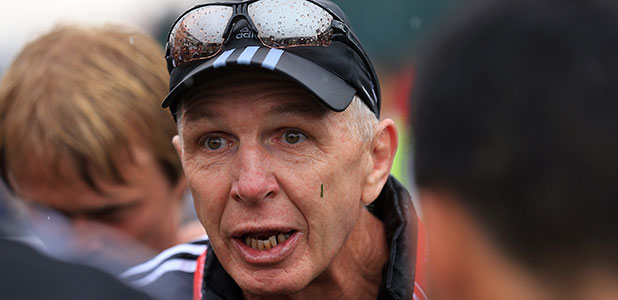Titch
0And so it ends.
Twenty-two years is an ungodly amount of time to be doing anything, let alone something at the very pinnacle of your endeavours. Yet that’s precisely what Sir Gordon Tietjens has done at the helm of the New Zealand (“All Blacks”) Seven’s programme, an absolute eternity around a game measured in seconds.
In 1994 Jim Bolger was in his second term as Prime Minister and the MMP system was on the horizon, petrol cost about $1.15l, a Big Mac $2.95, and rugby was still an amateur game. That year a former Bay of Plenty provincial player also took over as sevens coach, when the game was seen as something of a sideshow to 15s. “Titch’s” impact was immediate, unleashing a giant Tongan teenager named Jonah Lomu onto the stage at that years Hong Kong tournament. Two years later he masterminded another Hong Kong triumph with Lomu as his spearhead and Christian Cullen as the finisher.
Sevens remained a part-time until the establishment of the World Series in 1999. Few people recall Titch was also the Bay of Plenty’s NPC coach until 2002, but he handled both jobs. The World Series brought new expectations, and Titch seemingly couldn’t have been more in his element. He became the master coach, innovator, and tactician all in one.
Mt Maunganui’s Blake Park was his own personal torture chamber. Survivors of his squad camps that featured two and three-a-day sessions mixing game play and brutal fitness work will attest to that, but it had its purpose; conditioning players for the rigours of (hopefully) six high-octane games in two days and ensuring that in the final moments of matches his charges were fitter physically and mentally than their opponents. When Piri Weepu – sent there to work on his fitness in his recovery from a broken ankle suffered in the previous year’s NPC ahead of the 2011 World Cup – failed to make it through one of those tests there was no empathy, he was sent straight back out to do it all again.
I’ve crossed paths with the man a few times, but will never forget the first. I was a subs controller at Westpac Stadium for the Wellington leg; the World Series had used a law variation allowing five substitutes in the first three tournaments but reverted to just three (the ‘proper’ law at the time) from Wellington onwards. In the first minute of NZ’s first match Toby Arnold’s leg buckled trying to make a tackle (it transpired he’d torn his ACL in training) and was immediately replaced. Later, with the match well in hand he readied three subs, and I had to tell him and his team manager they could only make two more.
I copped that famous glare – and by god it’s unnerving as you wonder what’s coming next – but it quickly dawned on Titch that in his focus he’d forgotten the change. “Yep you’re right” came the reply and I could breathe again.
His players were undoubtedly well-attuned to his expectations; not just what we saw but also what we didn’t. After a poor day in Wellington usually bearded core members DJ Forbes, Lote Raikabula, and Tomasi Cama emerged for day two clean shaven; it wasn’t hard to work out what the message, or how it was delivered, was. Discipline and results went hand in hand.
Those results? 12 World Series titles, two 7s World Cups, four Commonwealth Games golds. Considering that he often had to reinvent the squad annually as sevens remained second-fiddle to the 15s game and was regularly denied the very best talent, it’s an unworldly set of achievements.
Titch didn’t get the finale he arguably deserved with the disappointing showing in Rio in the game’s Olympic debut, but the fact that rugby was back in the Olympics was as much down to him as anyone else, something then IRB President Bernard Lapasset referenced when the inclusion was announced.
The announcement of his retirement was treated with similar reverence with tributes from across the game.
The list of players – 44 in all – that have played under Titch that have also worn the full All Black jersey is something of a who’s who – Lomu, Cullen, Rokocoko, both Gear’s, Jane, (Ben) Smith, Messam, and both Savea’s to name some – and testament to Titch’s ability to firstly spot talent, and then develop it. He became a fixture sideline at tournaments up and down the country, instantly recognisable despite the cap and wraparound sunglasses, notebook usually in hand.
Already knighted for services to rugby, and a member of the World Rugby Hall of Fame there are precious few accolades that could be left for him, but you get the feeling he’s already more than content with what he’s accomplished, and it’s going to be odd not seeing him in the middle of the huddle in Dubai in a few weeks’ time.
He’s deserved to put his feet up, but somehow I don’t think he’ll enjoy that.
Revolutionary. Visionary. Winner. Icon.
Thanks Titch.
Follow Scott on Twitter

